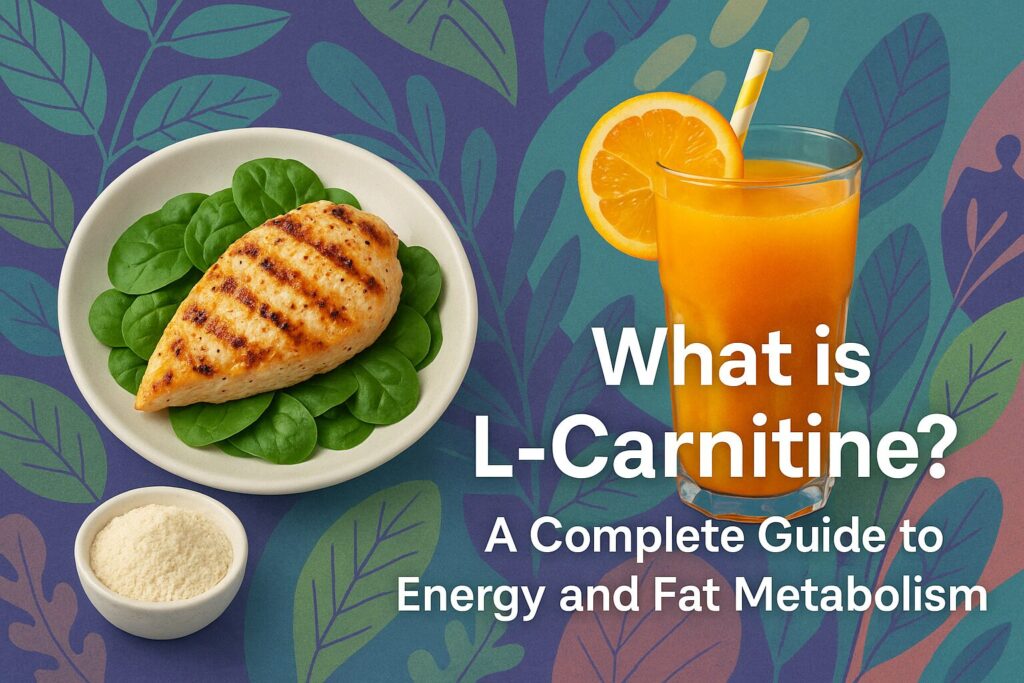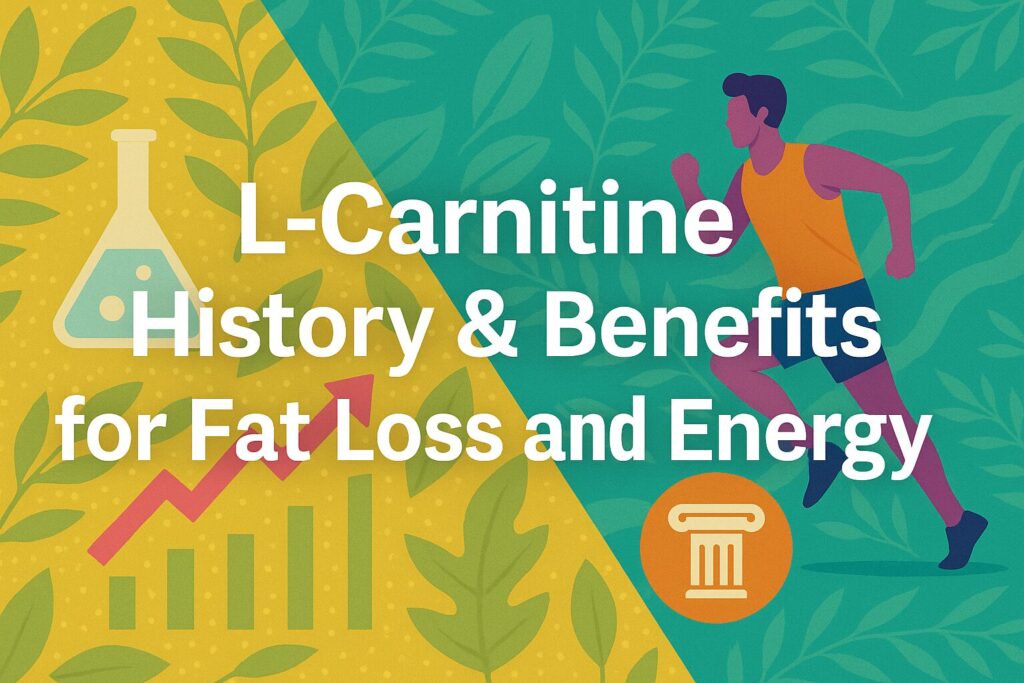
If you’ve ever searched for ways to burn fat faster or boost your energy naturally, you might have come across the term l-carnitine. But before you add it to your supplement stack, let’s answer the basic question: what is it, and why does everyone talk about it?
What is it Exactly?
If you’ve ever typed “what is it” into Google, you’re not alone. It’s one of the most searched fitness-related terms today — and for good reason. L-Carnitine is a naturally occurring compound in the human body that plays an essential role in energy production, fat metabolism, and overall vitality. But understanding exactly what it is, how it works, and why it matters can give you a serious edge in your health and fitness journey.
Read Also: Chapter 2: How L-Carnitine Works In The Body
At its core, it is a type of amino acid derivative, which means it’s created from two amino acids: lysine and methionine. Your body manufactures it in the liver and kidneys and stores it in places where energy demand is high — such as the muscles, heart, and brain. But the real question remains: what is it doing in your body that makes it so valuable?
The answer lies in its function. It works like a fat transport vehicle. It helps shuttle long-chain fatty acids into the mitochondria — the energy-producing centers of your cells. Once inside, these fats are oxidized, or “burned,” to produce ATP (adenosine triphosphate), the basic unit of energy that powers virtually every cellular process. In simple terms, when someone asks “what is it,” the easiest explanation is: it turns stored fat into usable energy.
Now here’s where it gets even more interesting. Your body does produce it naturally, but the amount depends heavily on your genetics, diet, and nutrient availability. To synthesize it effectively, your body needs adequate levels of Vitamin C, Vitamin B6, Niacin, and Iron. If you’re deficient in any of these, you may also be producing less — which can leave you feeling tired, sluggish, and unable to burn fat efficiently. That’s why so many people — especially athletes, vegetarians, or those with certain health conditions — start researching what is it and whether they should supplement it.
Beyond its metabolic function, the phrase “what is it” opens the door to other surprising benefits. For instance, some forms — like Acetyl- — can cross the blood-brain barrier and have been shown to support memory, mood, and cognitive function. Others, like Propionyl- may improve circulation and help with certain types of cardiovascular conditions. So when we ask what is it, we’re really asking about a group of closely related compounds that can impact everything from your brain to your muscles to your heart.
Another reason this compound is gaining so much attention is because it offers a non-stimulant solution for energy and fat loss. Unlike caffeine or harsh thermogenics, it doesn’t give you the jitters or cause a crash. Instead, it works gradually, by improving your body’s ability to tap into its own fat stores for energy. That’s why fitness professionals often recommend it for people who want more stamina during workouts, or who are hitting a fat-loss plateau. If you’ve ever felt drained during training or cardio, knowing what it can support you may be a game-changer.
Let’s also address the common myth: that it is only for athletes or bodybuilders. That couldn’t be further from the truth. Understanding what is it can benefit everyday individuals who are simply looking to increase energy, improve focus, or support healthy aging. In fact, as we get older, our body’s natural production tends to decline. This drop can result in fatigue, reduced muscle mass, and even cognitive slowdown — all things that may help improve with the right dosage and support.
And finally, from a dietary perspective, what is it doing in our food sources? It’s found mostly in animal products — red meat, fish, poultry, and dairy — which is why vegetarians and vegans often have lower levels. This also makes supplementation particularly useful for plant-based eaters who want the benefits of fat metabolism and energy support but don’t get enough from their diets.
In summary, when we ask what is it, the answer is much more powerful than just “a supplement.” It’s a naturally occurring, science-supported molecule that helps your body turn fat into fuel, power your workouts, support your heart and brain, and give you cleaner energy throughout the day. Whether you’re looking to lose weight, improve your endurance, or simply feel more vibrant — l-carnitine may be the missing piece.
What is L-Carnitine Used For?
Fitness lovers, athletes, and people trying to lose weight use it for its energy-boosting and fat-burning effects. Whether you’re hitting the gym or just trying to stay active throughout the day, understanding what is it used for can help you decide if it’s right for you.
What is L-Carnitine Found In?
You’ll find it naturally in red meat, chicken, fish, and dairy. So if you eat a mostly plant-based diet, you might have lower levels. That’s why many vegetarians and vegans ask, what is it, and should I supplement it?
How Does L-Carnitine Work in the Body?
When you eat fat, it needs to be transported into the mitochondria to be used as energy. That’s exactly what it does. It acts like a shuttle, moving fat where it can be burned — helping you feel more energized and supporting fat loss at the same time.
What is L-Carnitine Compared to Caffeine or Fat Burners?
Unlike caffeine-based supplements, it doesn’t stimulate your nervous system. Instead, it gives you clean, steady energy by turning fat into fuel. So if you’re wondering, what is it compared to pre-workouts, it’s more subtle and sustainable.
Can You Be Deficient in L-Carnitine?
Yes, especially if you’re vegetarian, have certain medical conditions, or don’t eat enough protein. Common symptoms include fatigue, brain fog, and weight gain. That’s why more people are now researching what is it deficiency and how to fix it naturally.
What is L-Carnitine’s Role in Brain Health?
There’s a form called Acetyl- that crosses into the brain. It’s shown to help with focus, memory, and even mood. So if you’ve heard someone say what is it for mental clarity, they’re probably talking about this brain-boosting version.
Summary: What is it in Simple Words?
In short, what is it? It’s your body’s natural fat shuttle — turning fat into clean energy, improving performance, and even supporting brain function. If your goal is weight loss, better workouts, or more energy without crashes, l-carnitine might be the supplement you need.
Coming Up Next: The History of it
Now that you know exactly what is it and how it works in the body, the next chapter will take you through its fascinating discovery — and how it became one of the most talked-about fitness supplements worldwide.



Pingback: L-Carnitine: History & Evolution And How It Affects You
Pingback: Benefits of L-Carnitine for Fat Loss & Energy Boost - fithut.in
Pingback: L-Carnitine Dosage: How Much Should You Take Daily?